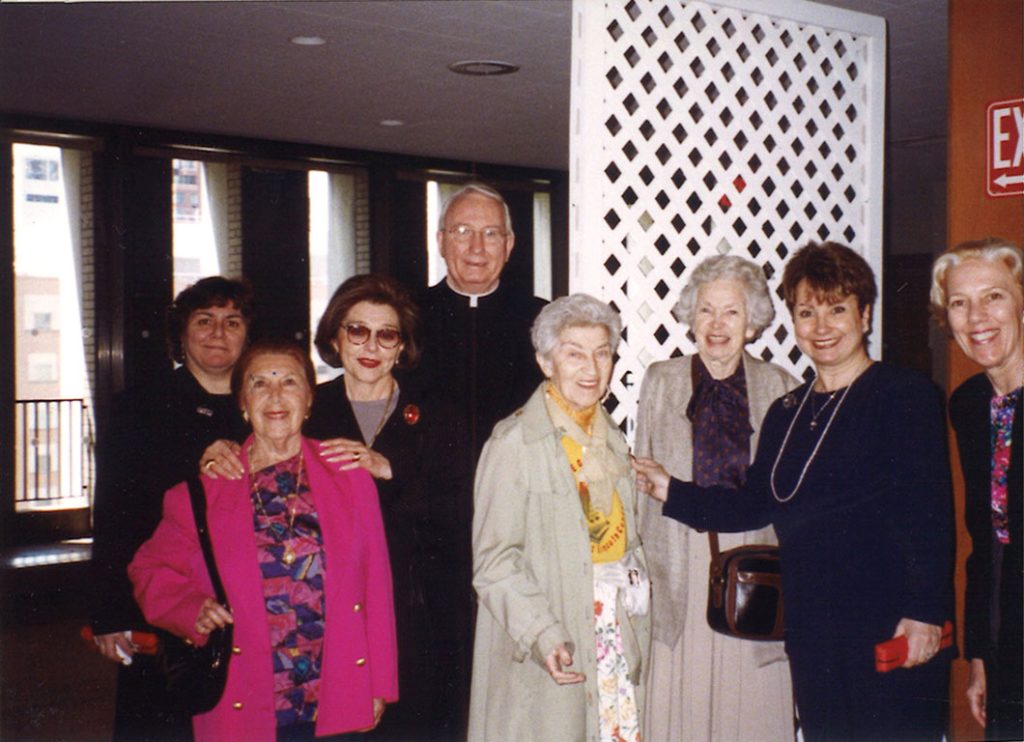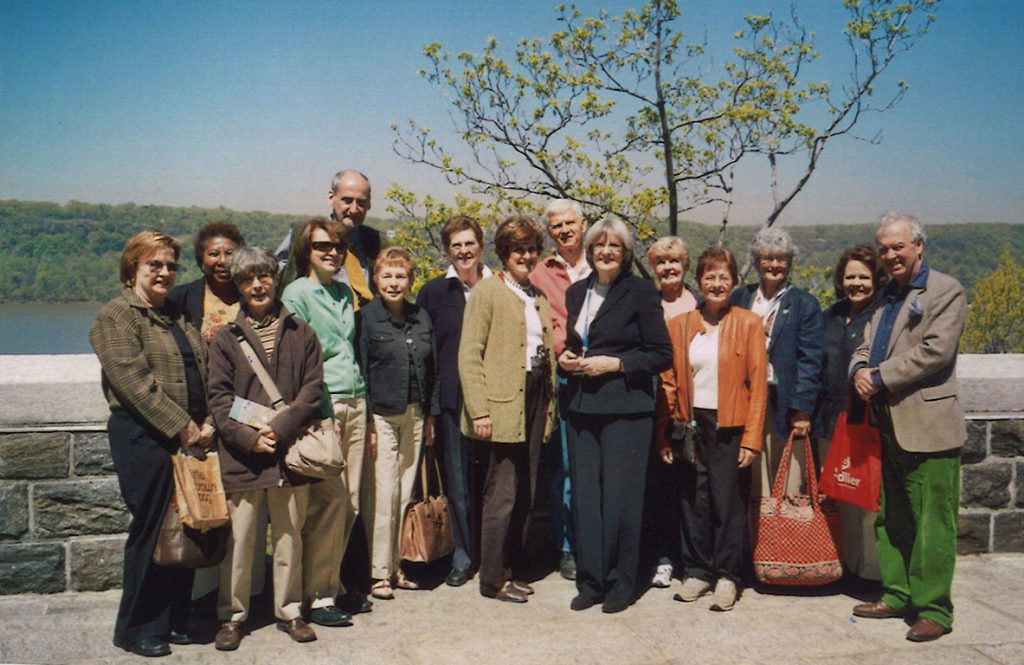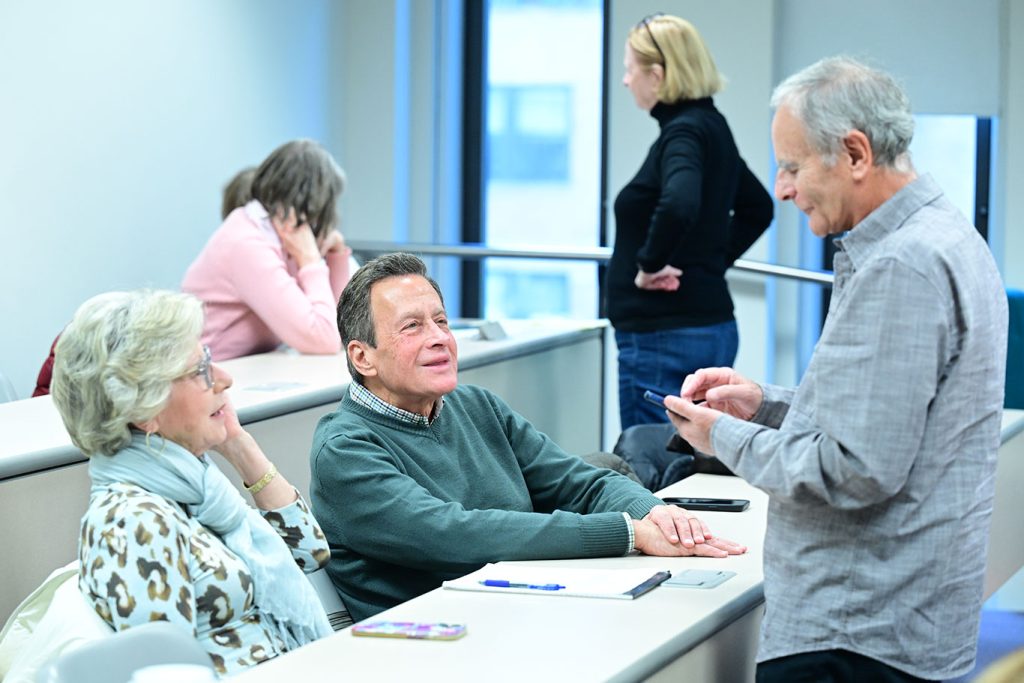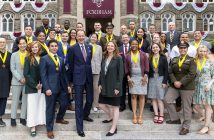After decades of working in the sciences, Timothy Kiehn, Ph.D., was eager to finally explore the humanities.
In 2011, he signed up for a course in Fordham’s College at 60, where he read Ulysses, James Joyce’s epic novel about a day in the life of Leopold Bloom.
“It’s not something I’d sit at home and read by myself, but Brother Ed Kent, who taught it, made it so fascinating,” said Kiehn, a clinical microbiology professor at Memorial Sloan Kettering Cancer Center.
Fordham’s College at 60, which is celebrating its 50th anniversary this year, offers a wide array of classes for lifelong learners like Kiehn. The program’s name refers to both its location on 60th Street and its student body, most of whom are older adults looking to pursue their interests and passions. This fall’s offerings included courses on topics ranging from the psychology of psychopathology and Dante’s Inferno to social security and the Supreme Court.
For Kiehn, the Ulysses class was an opportunity to leave behind pathogenic microorganisms for a “Blooms Day” celebration with his classmates, where Joyce fans gathered to read the novel aloud together.
“It was just fantastic. We went through the whole thing, and it ended at two o’clock in the morning,” he said.
Like Kiehn, Carolyn Titone, FCLC ’79, returned to Fordham for a College at 60 course in 2021 after successful careers in acting and advertising. She and her husband currently co-own Orchard Hill Cider Mill in Middletown.
Her first course was called Reality Has Always Had Too Many Heads: An Introduction to Literary Theory. Reading the course description, she was intrigued by concepts such as trauma theory, queer theory, and post-colonial criticism.
“I thought, ‘I don’t know what half of this stuff is,” she said.“Instead of taking something in my wheelhouse, I decided to explore things I had never studied.”
This semester, she’s enrolled in two courses: China, Russia, Ukraine, and the World; and Slavery, the Half Has Never Been Told.
“As you get older, it’s really important to challenge yourself. I could take theater courses and have a great time, but to develop a point of view about race theory or something like that, that’s making your brain work,” she said.
Celebrating 50 Years
Founded in 1973 by former Cambridge University Press editor Robert Adamson, Ph.D., College at 60 was originally geared toward non-traditional students of any age looking to earn an undergraduate degree. It was part of Fordham’s College at Lincoln Center before being moved in 1998 to the College of Liberal Studies (now the School of Professional and Continuing Studies).
The credit-bearing course degree pathway was phased out between 1996 and 1999, and the current model, a non-credit program, replaced it.
George Shea, Ph.D., a dean emeritus of Fordham College at Lincoln Center, taught a class in the program’s first year and came out of retirement in 2011 to teach again. He said the fact that Americans are living longer makes it more necessary than ever.
“We’re getting close to the point where people don’t really start to work until their late 20s, and they often retire in their 50s, and they’re living a long time,” he said. It’s important that Fordham help “keep those people’s minds working.”

Cira Vernazza, Mathilde Freund, Marie Sheehan, Dvora Minto, Sister Eleanor Carr, Rosemary Dejulio, Julianna Gilheany, and president Emeritus Joseph O’Hare, SJ, in 1986. Photo courtesy of Cira Vernazza
Staying Vibrant
Cira Vernazza, Ph.D., a former director of College at 60 who was involved with the program for 39 years, promptly signed up for classes herself upon retirement. She credited Adamson with teaching her how to look at older adults differently.
“He showed me how vibrant retirement can be. In 1981, the image that most people had was you either sat in a rocking chair, played golf, took care of the grandchildren, or visited family,” she said.

A College at 60 class trip to the Cloisters in 1985, led by professor Elizabeth Parker. Photo courtesy of Cira Vernazza
Nicole Bryan, an associate dean for academic programs at Fordham’s School of Professional and Continuing Studies, who took over the program in 2021, noted that the pandemic took a toll on enrollment, but Vernazza and the late Laura Greeny, who was an assistant director, set the stage for a rebound.
“Cira and I share a belief that aging is a beautiful experience that should be both celebrated and respected, and that is the culture we want to keep alive in College at 60,” she said.
Anthony Davidson, Ph.D., dean of the School of Professional and Continuing Studies (PCS), called the program an integral part of the college.
“PCS is all about providing lifelong learning to anyone and everyone who pursues it,” he said.
“The energy and enthusiasm of these students for courses ranging from Shakespeare to sustainable business practices to the arts is a joy to behold.”






